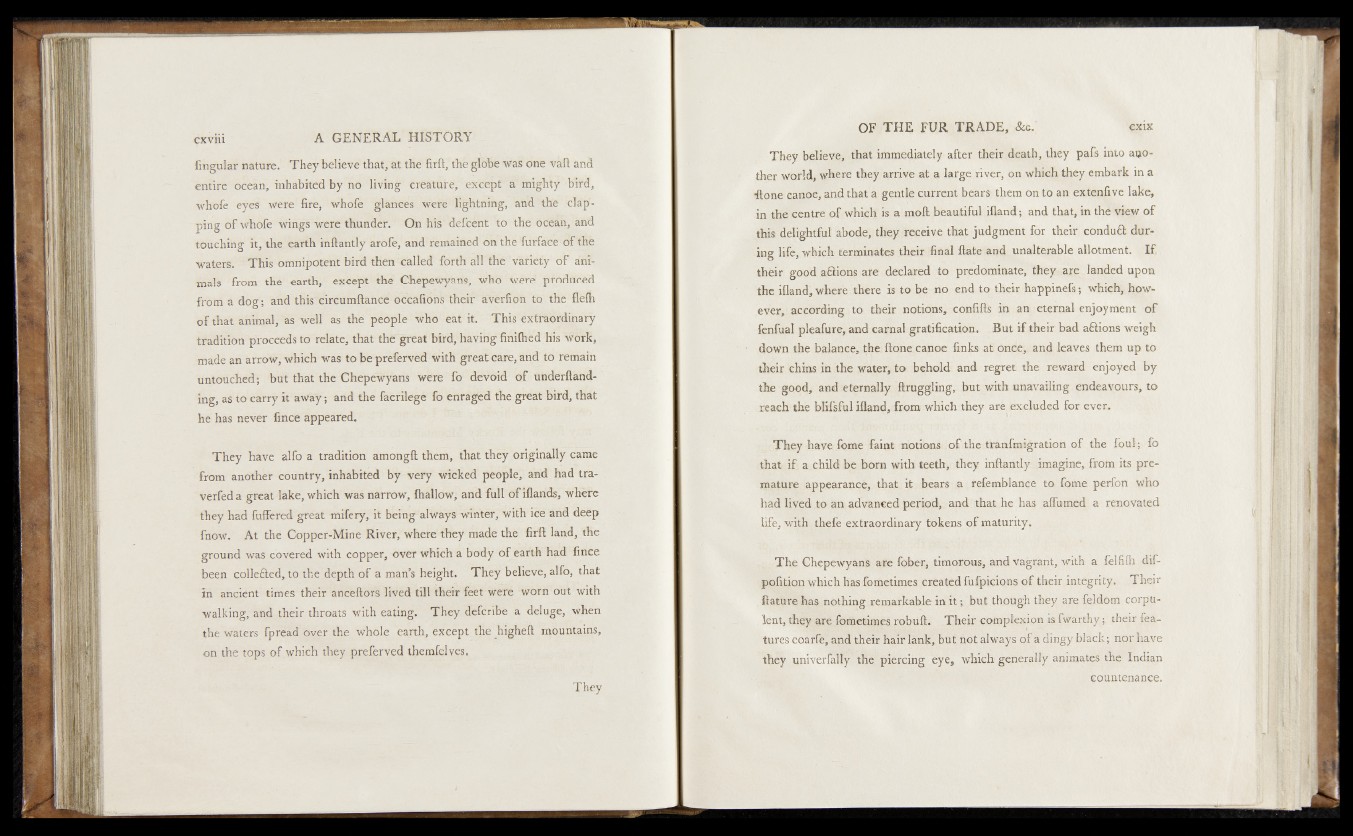
fihgular nature. They believe that, at the ftrft, the glbfoe was one vaft and
entire ocean, inhabited by no ' living creature, exé'èpt a" mighty hird,
whole eyes were fire, whole glances were lightning, ahd the cfefpf-
ping of whofe wings were thunder. On his del'cent to‘ the' ocean, and
touching it, the earth inftantly arofe, and remained on thë furface óf the
waters. This omnipotent bird then called forth all the variety o f animals
from the earth, except the Chepewyans, who were produced
from a dog; and this circumftance occalions their aV&rlioh to the flelh
of that animal, as well as the people who eat it. This dxtraordinary
tradition proceeds to relate, that thegreat bird, having finilhed his work,
made an arrow, which was to be preferved with great care, and to remain
Untouched; but that the Chepewyans were lb devoid of underftand-
ing, as to carry it away; and the facrilege lb enraged the great bird, that
hè has never fince appeared.
They have alfo a tradition amongft them, that they originally came
from another country, inhabited by very wicked people, and had tra-
verfed a great lake, which was narrow, {hallow, and full ó f iflands, whëfe
they had fiifiGM^^^-'inifeiy,'1tbdng-'dVtay^v^é^widHt ièë-ahd deëp
fnow. At the Copper-Mine River, where they made the firft land, the
ground was covered with copper, over which a body of earth had fince
been collefted, to the depth of a man’s height. They believe, alfö, that
in ancient times their anceftors lived till their feet were worn out with
walking, and their throats with eating. They defcribe a deluge, when
: the waters. fpread over the whole earth, except the higheft mountains,
on the tops of which they preferved themfelves.
They believe* that immediately after their death, they pafs into another
world, where they arrive at a large river, on which they embark in a
4tone canoe, and that a gentle current bearsithem on to an extenfxve lake,
in the centre of which is a moll beautiful illand ; and that, in thé view o f
this delightful abode, they receive that judgment for their condu& during
life, which terminates their final Hate and unalterable allotment. If.
their good aftions are declared to predominate, they are landed upon
the illand, where there is to be no end totheirhappinéfe ; which, hpw-
ever, according to their notions, confills in an. eternal enjoyment o f
fenfual pleafure,and carnal gratification. But if their bad aélions weigh
down the balance, the Hone canoe finks at once,. and leaves them up to
their chins irithe water, to behold and regret the reward enjoyed by
the goqd, and eternally {haggling, but with unavailing endeavours, to
reach the bSfsful illand, from which they are .excluded for ever. :
They have fome faintnotions o f the tranfmi^ration of the loul; fio
that i f a child be born with teeth, they inftantly imagine, from its pre-
»a$tiFe:!a!ppcaira»cèi..itb8et; it '• '.hears a tejfemblande to feme perfon Who
had lived .to an advanced period, and that,he has ;aftumed a reftovated
..fife, with thefe extraordinary tokens of maturity.
The Chepewyans are foben, timorous, anel.vagrapt, with a felfilh dif-
pqfi^on which has fsmetimes created fufpieions of their integrity^VI’foejr
ftature has nothing remarkable in it ; but th.ough fheyja^ feldom corpu-
Jéntpthéy'isre foretimes,robuft* Their cptB>p?exipn.i;sfw!'arthy ; their features
coarfe, ana tneir hair lank, but not always' óf a dingy bfeck; ngr have
they univeruufpf the piercing "eye, which geheraU^anim^es the Indian
countenance.